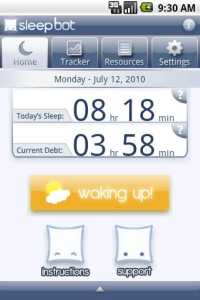Back in September 2008, the Washington Post ran an interesting look at self-surveillance, Bytes of Life, interviewing a number of people who were dutifully tracking numerous data points in their day-to-day lives. It is a good introduction to the subject, but unfortunately focuses on some of the more obsessive types in an already obsessive endeavor. For example,
Self-trackers like [Chris] Messina and [Brynn] Evans could spend hours online, charting, analyzing, tracking. Life as a series of pure, distilled data points, up for interpretation.
I’m not sure if that’s reporter Monica Hesse’s take on self-surveillance or Messina and Evans really do enjoy spending that much time, but here’s my take — if you’re spending more than a few minutes a day capturing and tracking data, you’re doing it wrong. I’d say on most days I spend about at most 10 minutes doing the charting/analyzing/tracking routine (and I’m currently tracking 16 different variables). This is the computer/Internet age — automate, automate, automate and get back to living your life.
The other thing I find a bit odd in this article and others by proponents of self-surveillance is the extent to which you can make decisions based upon such data. There seem to be people, for example, who track their daily/hourly/whatever moods and then attempt to correlate that with other events.
Tracking can “zoom out over my entire life,” he [Messina] says. It could, for example, help him better understand the aforementioned breakup. “When you’ve self-documented the course of an entire relationship, trivia that doesn’t seem like much could, over time,” help him understand exactly what went wrong, and when.
Maybe, but I doubt it. I suspect that such data would either be obvious — wow, my mood is terrible the day before my dentist appointments as I have a childhood fear of dentists — or it will be specious correlations that are confused for causation.
So what exactly is self-surveillance good for beyond the obsessive need to do it? For me, it is primarily a) a tool for meeting personal goals, and b) a way to objectively look at the progress I’m making on those goals.
For example, I really want to lose about 50 pounds. But losing weight is difficult, and as my daughter’s endocrinologist told me, we have a psychological tendency to overestimate the amount of exercise we’re doing. So if I take the dog for a walk a couple months a day, there’s a strong part of me thinking “okay, I took the dog for a couple walks, I can skip the treadmill.” Tracking weight, dog walks, treadmill, and other workouts does two things. First, it forces me every day to record objectively just what I did the previous day. Did I get on the treadmill? If not, a big 0 goes in there and I’m reminded I really should have done so. Moreover, I can see pretty much what effect that and other decisions have on my weight.
That’s a fairly traditional method of self-surveillance, but I use the same principle to keep me on target for my reading goal this year. Not only do I track when I start and finish a book, but I go so far as to track and record daily how many pages I read the previous day. Again, when I have to put in 0-15 pages, I realize there’s no way in hell I’m going to meet my goal with too many days like that. On the other hand, when I can stuff 172 in that particular chart, it is a very nice positive reinforcement that says “see, you can really do this.”
I don’t want to turn all Norman Vincent Peale here, but IMO a good portion of life is tricking/persuading ourselves to stay on task to achieve difficult goals. Self-surveillance can play a major role in personal achievement without becoming an obsessive substitute for it.

